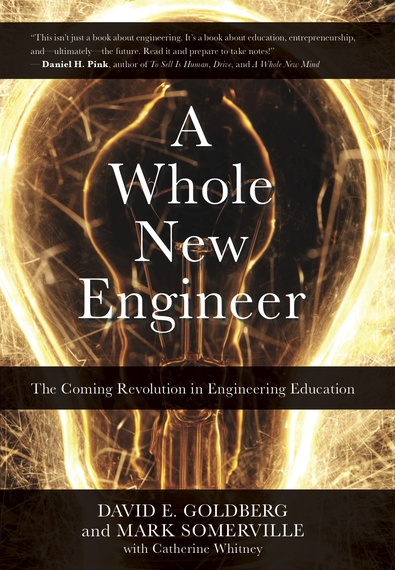Mark Somerville and I have put the final touches on the production of our book A Whole New Engineer: The Coming Revolution in Engineering Education, and I was reflecting on large writing projects such as books and how easy it is to underestimate the amount of work required and the amount of learning that goes on in writing one. The tendency is to think, "This will be easy. I'll just write down what I know about subject X and it will be good." Of course, you start the project, and find that (a) you didn't know as much as you thought you did, and (b) you had a lot of learning and figuring out to get to the end. Of course, some of this is the human tendency to underestimate difficulty and overestimate capacity as pointed out in The Invisible Gorilla and related research. If we were more realistic about the scope of such projects, it's a reasonable question to ask whether many would would start them.
 This time, however, with A Whole New Engineer, the misestimation took on a different flavor. Yes, we underestimated both the task complexity and learning required, but this time we also missed the deeper nature of the task. In the past, what started as largely a textbook or monograph project turned out that way. This time, I thought Mark and I were writing a how-to manual on engineering education reform with some personal anecdotes, but the deeper nature of the project didn't reveal itself until we were well into the project.
This time, however, with A Whole New Engineer, the misestimation took on a different flavor. Yes, we underestimated both the task complexity and learning required, but this time we also missed the deeper nature of the task. In the past, what started as largely a textbook or monograph project turned out that way. This time, I thought Mark and I were writing a how-to manual on engineering education reform with some personal anecdotes, but the deeper nature of the project didn't reveal itself until we were well into the project.
And the the Chapter 5 title, The Emotional Breakthrough, starts to characterize the book we found inside of us. As we started to tell the stories of what happened at Olin (www.olin.edu) and iFoundry (www.ifoundry.illinois.edu), we started to recognize that the usual rational code words used to describe educational reform (content, curriculum, pedagogy, learning outcomes, active learning, project-based learning, etc., etc.) were inadequate to describe the underlying experience of authentic reform.
Instead, we needed to admit that the secret sauce to both efforts was profoundly emotional in nature and that words like "trust," "courage," "joy," "connection," and "openness" (the pillars of Chapter 5) were necessary to convey and understand the experience. And this was excruciatingly hard for a couple of engineers to grok, but once we did, we knew there was no going back. Those distinctions sounded like we were talking about the underlying essence of authentic reform in foundational terms in a way that previous descriptions lacked.
And once we reached the emotional floor of the enterprise, we recognized that many of our colleagues would have the same difficulty we originally had in accepting and understanding this emotional language, that the natural tendency would be to reject these terms as "too soft" or "insufficiently rigorous" and to retreat to easy and safe words like "content," "pedagogy," "X learning (where X = active, experiential, project-based, etc.). Nevertheless, once the journey had come to this place, we knew that our job was to tell the travelogue as we had experienced it, as we had felt it.
And we hope that this is one of the lasting contributions of the book: to shift a discussion that continues to be held in largely rational terms to one that can unapologetically use the language of emotion and culture in ways that contribute to a more effective and holistic educational system.
A Whole New Engineer: The Coming Revolution in Engineering Education launches officially at 7:30pm ET on Wednesday, 1 October with an online hangout discussion of the making of the book. More information about the launch and the book is available at www.wholenewengineer.org and here. To help transform engineering education read about the Big Beacon movement (www.bigbeacon.org). For questions about the A Whole New Engineer or Big Beacon write to Dave Goldberg at deg@bigbeacon.org.
